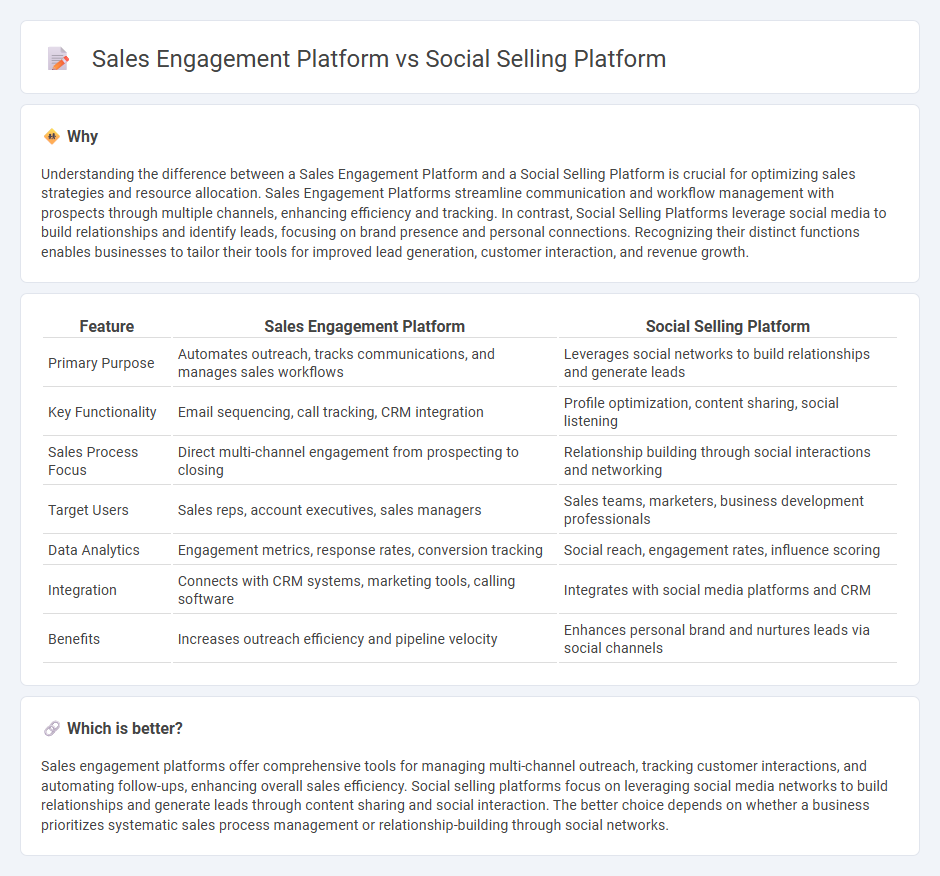
Sales engagement platforms streamline communication with prospects through automated emails, calls, and analytics, enhancing efficiency and tracking. Social selling platforms leverage social media networks to build relationships and identify leads by sharing relevant content and engaging in conversations. Explore how integrating both tools can transform your sales strategy for maximum impact.
Why it is important
Understanding the difference between a Sales Engagement Platform and a Social Selling Platform is crucial for optimizing sales strategies and resource allocation. Sales Engagement Platforms streamline communication and workflow management with prospects through multiple channels, enhancing efficiency and tracking. In contrast, Social Selling Platforms leverage social media to build relationships and identify leads, focusing on brand presence and personal connections. Recognizing their distinct functions enables businesses to tailor their tools for improved lead generation, customer interaction, and revenue growth.
Comparison Table
| Feature | Sales Engagement Platform | Social Selling Platform |
|---|---|---|
| Primary Purpose | Automates outreach, tracks communications, and manages sales workflows | Leverages social networks to build relationships and generate leads |
| Key Functionality | Email sequencing, call tracking, CRM integration | Profile optimization, content sharing, social listening |
| Sales Process Focus | Direct multi-channel engagement from prospecting to closing | Relationship building through social interactions and networking |
| Target Users | Sales reps, account executives, sales managers | Sales teams, marketers, business development professionals |
| Data Analytics | Engagement metrics, response rates, conversion tracking | Social reach, engagement rates, influence scoring |
| Integration | Connects with CRM systems, marketing tools, calling software | Integrates with social media platforms and CRM |
| Benefits | Increases outreach efficiency and pipeline velocity | Enhances personal brand and nurtures leads via social channels |
Which is better?
Sales engagement platforms offer comprehensive tools for managing multi-channel outreach, tracking customer interactions, and automating follow-ups, enhancing overall sales efficiency. Social selling platforms focus on leveraging social media networks to build relationships and generate leads through content sharing and social interaction. The better choice depends on whether a business prioritizes systematic sales process management or relationship-building through social networks.
Connection
Sales engagement platforms enhance communication and streamline workflows between sales teams and prospects, while social selling platforms leverage social media to identify, connect, and build relationships with potential customers. Integration of both platforms enables seamless tracking of interactions across multiple channels, improving lead generation and conversion rates. This connection empowers sales professionals to deliver personalized outreach based on real-time social insights and engagement metrics.
Key Terms
Social Networking
Social Selling Platforms prioritize leveraging social networking channels like LinkedIn and Twitter to build relationships and engage prospects through personalized content and social interactions. Sales Engagement Platforms integrate multiple communication tools, such as email, calls, and automation workflows, focusing on streamlining outbound sales processes and tracking activities. Explore the key benefits and features of each platform to determine the optimal choice for enhancing your sales strategy.
Multi-channel Outreach
Social selling platforms leverage social media channels to engage prospects through personalized content and relationship-building techniques, optimizing multi-channel outreach by integrating platforms like LinkedIn, Twitter, and Facebook. Sales engagement platforms offer a broader range of multi-channel outreach options including email, phone calls, SMS, and automation tools to streamline sales workflows and enhance communication efficiency. Explore how each platform can maximize your sales strategy through effective multi-channel engagement.
Automation
Social selling platforms leverage automation to identify and engage prospects through social media channels, streamlining personalized outreach and relationship-building. Sales engagement platforms automate multi-channel communication workflows, task management, and follow-ups, optimizing the entire sales cadence from email to calls. Explore detailed comparisons to understand which automation features best suit your sales strategy.
Source and External Links
12 Best Social Selling Platforms to Boost Sales in 2025 - Firework - Facebook and Instagram lead as social selling platforms best for B2C with features like shoppable posts and customizable storefronts; TikTok Shop excels for viral sales targeting Gen Z and millennials through shoppable videos and influencer collaborations.
Top 10 Social Selling Platforms and Tools (2025) - Shopify - Social selling is a strategy that connects businesses with customers via platforms like Facebook, Instagram, LinkedIn, TikTok, Pinterest, and YouTube by engaging through content and live selling to build relationships and drive sales.
Best Social Selling Platforms You Need To Know in 2025 - Tagembed - Tagembed and Pixlee TurnTo are highlighted social selling tools that turn social content into shoppable feeds, enabling brands to integrate user-generated content with e-commerce to enhance conversion through seamless shopping experiences.
 dowidth.com
dowidth.com